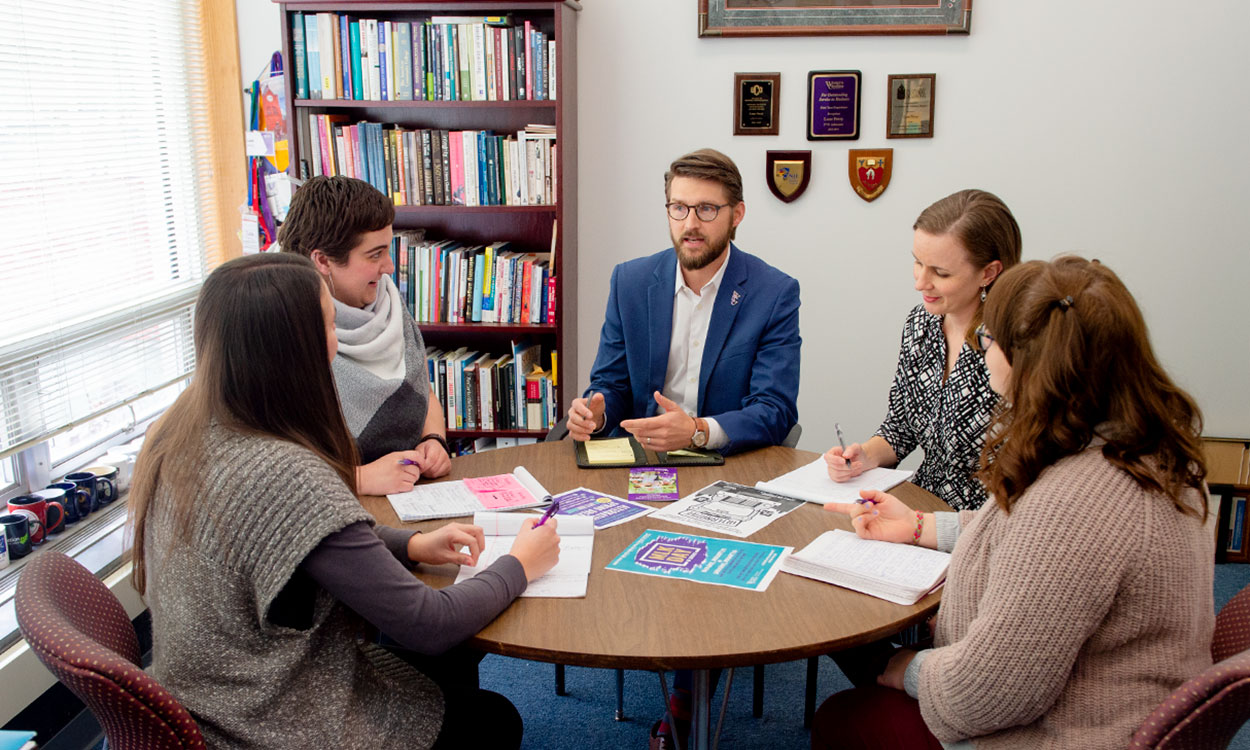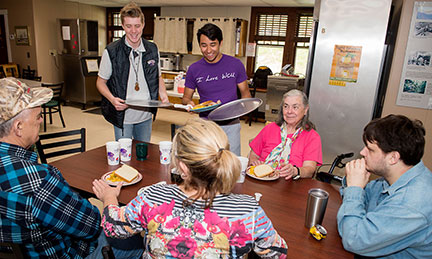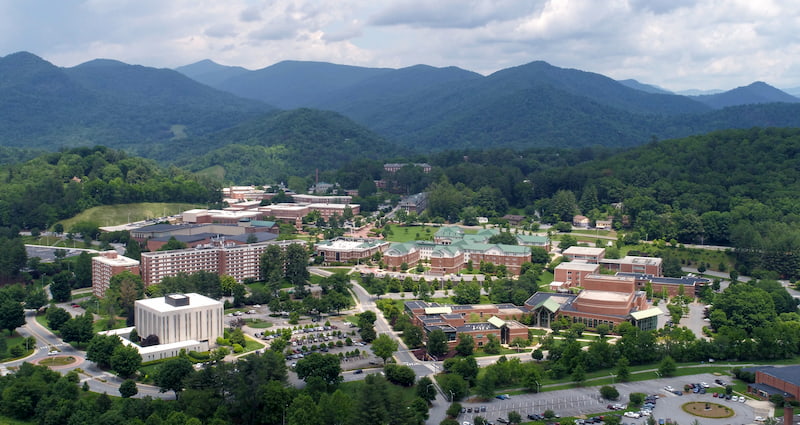Service-learning program reflects continuing transformation, adopts new name

Staff members of WCU's Center for Community Engagement and Service Learning gather for a planning and review session this week. They are (from left) Mackensie Jimison, Amanda Hanson, Lane Perry, Jennifer Cooper and Sydney Haboush.
A transformation is underway for Western Carolina University’s Center for Service Learning, including a name change to better reflect the center’s role and a fundraising effort to benefit student initiatives.
With the start of the semester, WCU’s student-centered program for helping others is now known as the Center for Community Engagement and Service Learning. The new name ― by adding two key words ― more accurately describes the scope and breadth of activities, said Lane Perry, who also has a new title of center executive director.
“I firmly believe that as an institution we are now starting to fully realize the potential of intentional, respectable and mutually beneficial approaches to our community engagement work, on and off campus and with our students, our community and our faculty and staff,” said Perry. “Additionally, the inclusion of ‘community’ and ‘engagement’ in our name seeks to encompass the idea that service is something so much more than what occurs inside or outside of a classroom, with our community or frames our research purposes. Simply stated, it is a way of going about fulfilling the mission and purpose of our institution and as a regional comprehensive university.”
The transformation is in alignment with the university’s “2020 Vision” strategic plan, as well. “The center’s work and that of our Office of Community and Economic Engagement and Innovation complement each other very well and strengthens our institutional commitment, approach and brand of engagement,” said WCU Acting Provost Carol Burton.
The newly renamed center is in the early stages of a fundraising effort that would provide support to students as they become involved in service learning by helping to cover the cost of materials, stipends and those associated with involvement in activities. The center has raised nearly $5,000 so far.
Other changes include a staff expansion based on a reallocation of internal institutional funds, with the creation of the new position of assistant director, filled by Amanda Hanson. “I am excited to see a truly student-led, student-run service program develop,” Hanson said. “As the focus of the center expands, we have the unique opportunity to harness a small portion of the immense creativity, drive and determination of the Catamount student family to help build an even stronger local community.”
Hanson will focus specifically on student development efforts so other staff members can concentrate on additional programs and initiatives to help support faculty and staff, community partners, graduate students and other constituents and stakeholders in the region and across the state.
“As our staff grows, I’m thrilled to have more opportunities to foster collaboration with our community partners,” said Jennifer Cooper, associate director. “We have over 130 nonprofit partners spread across Western North Carolina, so there are always lots of new plans and projects to keep up with. Having additional time to learn about these initiatives, and to help connect our students, faculty and staff with groups that they can successfully collaborate with, will help WCU make a greater impact on the region, as well as ensuring that our students get the greatest benefit from their civic engagement projects.”

Students help with Jackson County's Community Table to provide nutritious meals to neighbors in a welcoming environment.
The center has increased the number of co-curricular service opportunities at WCU by adding more days of service, such as National Volunteer Week and 9/11 Day of Service, and offering additional service trips, including three-day options.
“Our partnership with the Center for Career and Professional Development has allowed us to go from offering a single volunteer fair each year to offering a nonprofit concourse each semester during Catamount Career and Networking Day,” Cooper said. “We have begun partnering with university units, like the Belcher College of Fine and Performing Arts, the Advising Center and the Staff Senate to set up days of service for their members. Usage of community service leave has grown from 490 hours in 2009 to 4,519 hours last year.”
Another initiative being developed is for WCU to become a national model for graduate student community engagement development to aid graduate students in their comprehension, competency and practice of community engagement as a resource and realize their collective potential.
The program of community service began at WCU in 2000 and quickly grew into a department in the Division of Student Affairs. The center promoted student participation in organized activities that would serve the community while helping students grow intellectually, socially and personally. The University of North Carolina Board of Governors approved the “center” designation in 2003, and the name was adopted in 2007 when it moved from the student affairs division to the academic affairs division.
Local, state and national awards and recognition have followed and the center has achieved many milestones. In 2005, the center launched an “Alternative Spring Break” program with an initial trip to assist hurricane ravaged Pensacola, Florida. The following year, the alternative break went international with a group going to Panama. By 2008, the number of community partners and service sites surpassed 100.
At its core, higher education should not only be about teaching students, Perry said. It should also be about preparing individuals to become better, more aware versions of themselves with the greater purpose of making communities collectively stronger, he said.
“I see the renaming, sustained focusing and adding of support in the form of our new assistant director of student community engagement as being yesterday’s vision for today finally realized,” Perry said. “Over the past 15 years, a sustained effort has been made by many students, faculty, community partners and leaders to build the capacity of our institution in the name of community engagement. It is inspiring to consider what the next 15 years may bring to our region, our community and our campus. In fact, it's what gets me up in the morning.”
For more information, contact WCU’s Center for Community Engagement and Service Learning at 828-227-7184 or servicelearning@wcu.edu.
